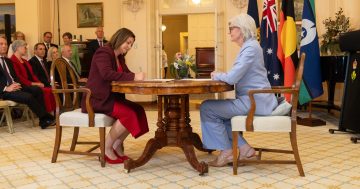
Kathryn Campbell, has been on leave from the APS since the Royal Commission into Robodebt handed down its report. Photo: File.
In the wake of the Robodebt scandal, senior bureaucrat Kathryn Campbell has been stood aside without pay from her $900,000 per annum AUKUS advisory role just three days after a royal commission report described the scheme as “neither fair nor legal”.
Ms Campbell, who was also a Major General in the Army Reserve, was Secretary of Social Services and Human Services at the height of the Robodebt crisis, going on to become Secretary of Foreign Affairs and Trade (DFAT) in the Morrison Liberal government.
She was removed from DFAT in June last year following the election, but given the special advisor role with Defence in July. In doing so, she retained the conditions of employment, such as remuneration, of her previous secretary role.
Multiple sources have confirmed that Ms Campbell was involuntarily stood down from her Defence role on Monday (17 July).
The royal commission’s findings were presented to the Governor-General on 7 July.
The report said that during Ms Campbell’s time as head of the Department of Human Services, she was “responsible for a department that had established, implemented and maintained an unlawful program”.
In a highly critical report, Commissioner Catherine Holmes said Ms Campbell did “nothing of substance” when she became aware of the substantial issues regarding the income averaging process and its probable illegality.
The commissioner also found that Ms Campbell failed to act when she had the opportunity to seek legal advice regarding the program’s operations.
Robodebt has been described as a “crude and cruel” process. Commissioner Holmes noted it created significant emotional and financial distress for people wrongly targeted by the department on the assumption they had lied about their income for the purposes of social security payments.
It’s alleged that several people took their own lives as a consequence of being wrongly pursued for debts.
Ms Campbell told the royal commission that she had assumed Robodebt was lawful, although internal departmental advice had already raised significant concerns. She agreed that she should have sought external legal advice, given the implications for those whom the scheme affected.
While she agreed that in hindsight, this was a big assumption to make, she insisted that she had never sought to mislead the government.
The royal commission heard evidence from several Human Services bureaucrats who said Ms Campbell was so feared that lawyers wouldn’t tell her things she didn’t want to hear.
The department’s former principal legal officer, Anna Fredericks, gave evidence to the inquiry that she was uncomfortable in 2018 with the department’s culture under Ms Campbell’s leadership and that a reticence to deliver unwanted news pervaded the department.
A number of crossbench and Greens politicians called on Ms Campbell to resign from her Defence role, describing it as an insult to victims of the scheme.
Greens senator Barbara Pocock also raised questions about how Ms Campbell was offered the Defence job, claiming there was “every indication” that the role has been constructed for the purposes of giving the former secretary a soft landing in the weeks leading up to her dismissal from DFAT.
Minister for Government Services Bill Shorten said any adverse findings regarding public servants would be considered by the Public Service Commission, Prime Minister and Cabinet and Attorney General before decisions would be made concerning their futures.
There has been no comment on Ms Campbell’s role from the Department of Defence.
Original Article published by Genevieve Jacobs on Riotact.
















